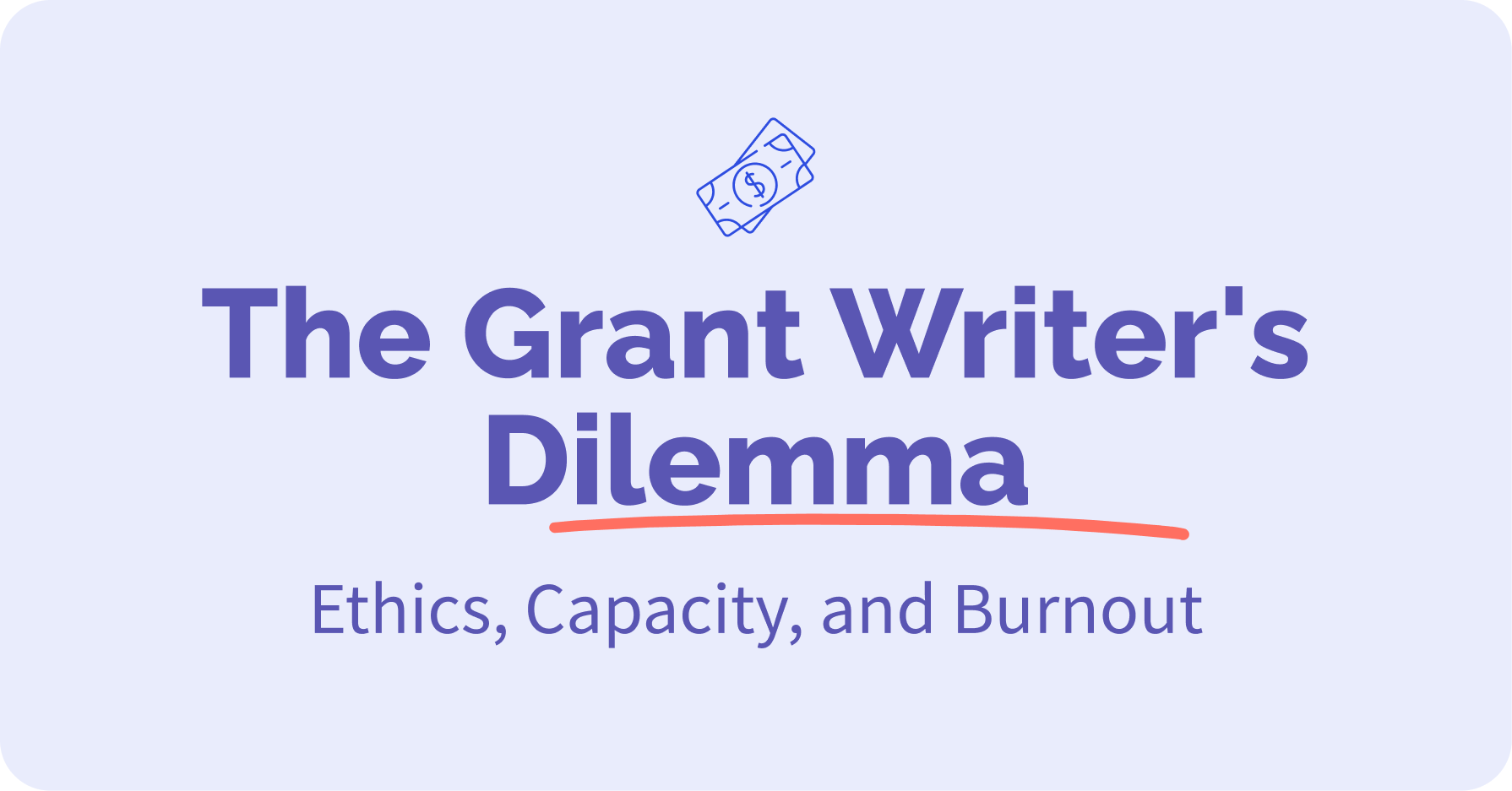Grant writers are often the unsung heroes in non-profit organizations. They’re the lifeline, working tirelessly to ensure their organization has enough funding to survive.
We do this by translating mission into money, vision into viable programs, and strategy into sustainability.
Our work is fulfilling. But behind the polished proposals and impact metrics lies a tension that presses on every grant writer: how do we continue to serve the sector with integrity without burning ourselves out in the process?
This is the Grant Writer's Dilemma.
The Growing Pressure on Grant Writers
Grant writing has always been a high-stakes, high-output role. But in the wake of growing demand, shrinking public funding, and increasing reliance on project-based revenue, many grant professionals are operating under unrealistic expectations.
Veronica Kulon, Senior Grant Consultant and Learning Specialist at Resurgens Impact Consulting, shares that one of the unseen challenges successful grant writers can get themselves into is inadvertently helping an organization rely too heavily on grants.
“Organizations sometimes make the mistake of depending too heavily on grants without diversifying their funding sources, which can lead to financial instability if grant renewals are uncertain.”
This is especially true for consultants and solo practitioners, but in-house grant writers aren’t immune either.
The expectation is often this: produce more proposals, chase more dollars, and stretch beyond your capacity. All while ensuring every proposal is perfectly customized, compelling, and successful.
Meanwhile, nonprofit budgets rarely include adequate room for capacity-building, much less sustainable fundraising infrastructure. Grant writers are too often brought in after the fact, with too little time and too much riding on one proposal.
Then there’s the wait—that long stretch of silence between submission and decision, where stress simmers and your energy is still tied up in a file that may or may not yield results. That emotional limbo can be exhausting, especially when clients or boards expect instant answers.
Another painful reality: doing the work and missing the grant deadline. Without a proper grant calendar or internal tracking system, organizations risk losing out on funding simply because a deadline got missed or buried. Nothing is more demoralizing than doing everything right—research, alignment, narrative—and still missing the window.
8 Ethical Gray Zones and Invisible Labor
One of the most under-discussed challenges in grant writing is the ethical gray zones many professionals are forced to navigate.
Here are 8 of the most common ethical gray zones grant writers face:
- Writing for orgs without infrastructure: Consultants are often asked to write grants for organizations that don’t yet have solid budgets, clear evaluation frameworks, or the capacity to deliver what they’re proposing. This can feel like building castles on sand.
- Being asked to "just tweak" old proposals: Reusing content isn’t inherently unethical, but repurposing a grant meant for a completely different program or funder can be. It’s especially concerning when nonprofits don’t understand how funder alignment works and expect grant writers to make anything sound like anything else.
- Unpaid discovery and strategy work: Many grant professionals provide far more than writing. They help shape program logic, budgets, staffing plans, and evaluation tools. But too often, this is treated as "free pre-work" instead of paid consulting.
- Ghost grant writing: When a funder expects that an application was written by someone internal, but in reality it was outsourced, there's often no clarity around authorship, transparency, or acknowledgement.
- Pressure for commission-based models: Despite clear ethical concerns, many clients push for performance-based or commission-style compensation. This models shifts the risk entirely onto the grant writer. Likewise, the Grant Professionals Association’s ethics board advises that members of their association should “not accept or pay a finder's fee commission, or percentage compensation based on grants and shall take care to discourage their organizations from making such payments.”
- Board and funder calls after hours: The boundaryless nature of nonprofit work often spills into evenings and weekends, with board members or funders calling after hours to discuss grants they didn’t read or understand until the last minute.
- Fear of transparency around numbers: Some organizations are so uncomfortable confronting their real financial picture that they ask writers to “ballpark” budgets or make assumptions. This erodes accuracy, trust, and ultimately, funding success.
- "Hey, I found this grant!": Often, leadership or board members will share a last-minute grant opportunity they’ve stumbled on. Nine times out of ten, it’s either due within 48 hours, or it’s for $500. Neither is worth the cost of time, stress, or brand trust. But saying no makes you look like the villain. We call this the shiny object syndrom, and there are a few tips from other grant experts that are worth noting.
- Worst of all? Doing everything right—securing the funds, executing the project—and watching those dollars be mismanaged by leadership or finance teams, resulting in money being returned. All that work, wasted. It’s infuriating and demoralizing. And it happens more often than we talk about.
The Toll of Unsustainable Expectations
Grant writers are mission-driven professionals. Most of us enter this field because we believe in equity, community care, and systems change. But when we're underpaid, overextended, and asked to compromise our ethics or capacity, the values that brought us to this work can feel weaponized against us.
Krista Kurlinkus, a grant trainer, warns in her article on grant writer burnout that, “over time, this continuous pressure leads to chronic fatigue, loss of motivation, decreased productivity, and ultimately, burnout.”
It’s not unusual for grant writers to work late nights or weekends to meet deadlines for organizations that don’t understand the complexity of the work. It’s also not unusual for writers to chase "maybe" clients for weeks, only to be told the budget has disappeared.
The result? Many seasoned professionals leave the field entirely or scale back to only work with select, values-aligned clients.
Building a Sustainable Grant Practice
So what’s the solution? It starts with redefining the role of the grant writer.
1. Set Boundaries Early
Have a clear intake process. Don’t start work without a contract. Define timelines, review expectations, and the scope of your involvement. If the organization isn't ready, say so—and offer a prep package if needed.
2. Price for Strategy, Not Just Writing
If you're shaping program design, building budgets, or guiding evaluation frameworks, that’s consulting work. Price it accordingly. You are more than a writer—you’re a strategist, a systems thinker, and a critical asset. Meredith Noble, a grant writer and trainer, has strong opinions on how much grant writers should charge in her YouTube video on the topic.
3. Work With Values-Aligned Clients
Ask tough questions upfront: Do they understand the grant process? Are they open to feedback? Do they see you as a partner, not just a vendor? The right clients make all the difference.
4. Protect Your Energy
Not every opportunity is the right one. Build rest into your calendar. Say no to last-minute rush work when you’re already at capacity. Your clarity and creativity are your most important tools—protect them.
5. Educate the Sector
Use your voice to advocate for better practices. Speak openly about the need for funder transparency, capacity funding, and fair consultant treatment. When we normalize ethical, sustainable grant development, everyone benefits.
6. Grant Readiness & Diversified Revenue
A sustainable practice starts with grant readiness. Teressa Huff, the host of the Grant Writing Simplified podcast, has years of experience advising nonprofits on grant readiness. She even has a TedX talk on it. Her message is always, “Don't apply for grants until your nonprofit is stable and has multiple funding streams.”
Organizations should be able to articulate their mission, measure impact, and demonstrate capacity—before they seek major funding. And just as important: grants alone are not a fundraising solution. A healthy nonprofit budget should include diversified revenue streams—donor engagement, earned income, events, or sponsorships. Relying solely on grants is a fragile foundation.
Final Thoughts
The Grant Writer’s Dilemma is real—but it’s not inevitable. By shifting how we approach our work, setting firm boundaries, and aligning with the right clients, we can do work that is both impactful and sustainable.
When we honor ourselves, we honor the sector. And this sector is worth it. Grant writers are essential.
Programming leads fundraising. Fundraising leads programming. The two must walk together.
Let’s build a sector that doesn’t just value funding outcomes, but also the people who make those outcomes possible.

.svg)



